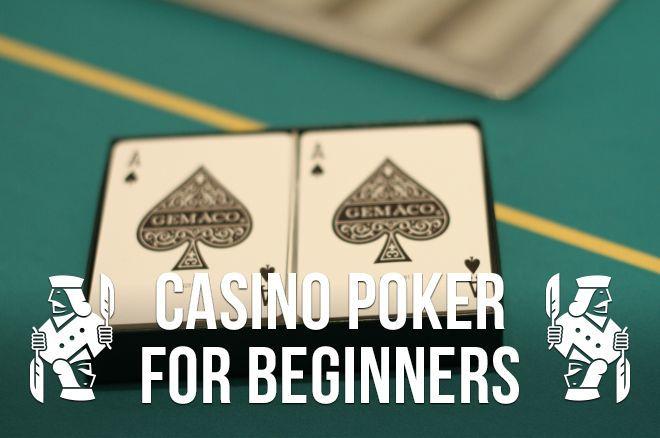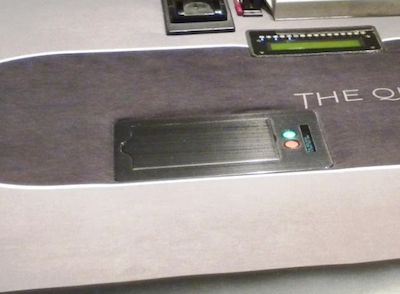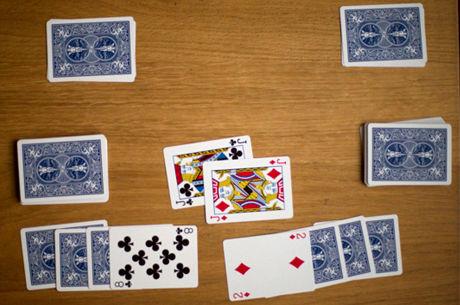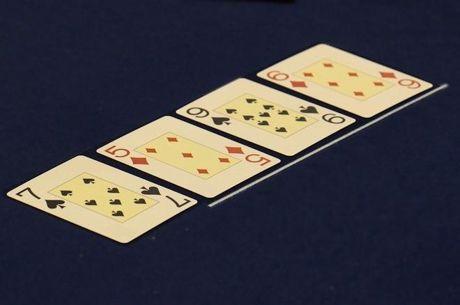Casino Poker for Beginners: Marked Cards, Automatic Shufflers & More

Ed. note: For those who might have missed it before, we're reprising Robert Woolley's series of articles for poker players who are new to live poker. The series is great for newcomers, and likely useful as well to those with experience playing in casinos and poker rooms.
I spent the entire article last time discussing the flexibility of the plastic cards used in modern casino poker rooms and how to use this feature to your advantage. But there is much more to know about cards, and what poker rooms do with them.
"New setup"
Once in a while, you'll hear a player ask the dealer for a "new setup." What he's asking is for the current cards in play to be replaced with new ones. Almost all poker rooms keep two decks of cards in rotation at each table. A "setup" is a pair of decks with contrasting back colors, so that they do not get intermingled.
The chief reason players make this request is superstition. They perceive that they have been getting an unlucky series of hands or bad beats, and they irrationally believe that a different deck of cards will change their luck for the better.
Please don't ever be one of the players who does this. It stops the game for five minutes or more while the dealer goes through the security procedures of inspecting the replacement decks and getting them shuffled properly. If there were some tangible benefit to it, fine �� but there isn't. The poker room is simply indulging the fancies of one player to the detriment of the rest. I really wish they would refuse such requests.
(As an alternative, I long ago proposed that poker rooms should require the player who requested the new setup to leave the room for 10 minutes. During that time, play would continue as usual, with the same cards. When the requesting player returned, everybody would just lie and tell him that the cards had been replaced, on the theory that what he doesn't know won't hurt him. However, I don't hold out any serious hope that any poker rooms will actually implement this brilliant plan.)
When I'm in an impish mood, I'll pass the down time by quizzing the requesting player on why he's asking for the change. I ask him to explain how a different deck of cards will make any difference in what hands he gets.
Of course, the player can never produce any coherent explanation of this, because there isn't one. My hope �� which is probably misplaced and futile �� is that the needling effect of forcing the player to admit that there is no rational basis for his belief will make him think twice before making this request again in the future.
Some players assume that when requesting a new setup, the cards brought to the table will be brand new ones. These players somehow convince themselves that new cards will be luckier than ones that have been used before. (I don't pretend to understand how they come to such hare-brained ideas.)
As I discussed in my last article, poker room cards are expensive, and made to last. They are carefully put away when a table closes in order to be used again. The replacement cards that are brought to the table are just as "used" as the ones they're replacing.
"These cards are marked!"
Those of us of a certain age might remember a funny TV commercial from the 1970s for M&M candy that featured cards covered with chocolatey fingerprints because the dealer was improvidently snacking on regular chocolate bars. The players are angry and about to lynch the dealer, until M&Ms come to the rescue, giving him a mess-free way to get his chocolate fix.
There is one legitimate reason to request a new deck �� or at least one new card �� and that is if one or more cards become visibly marked.
Clever commercials notwithstanding, chocolate is not very likely to be the culprit (though occasionally a messy player eating at the table does cause the cards to get greasy). Sometimes it's a small nick or tear in a card's edge. Most often, in my experience, the printed ink on the card's back develops a distinctive worn spot as the card ages.
You should always point out such defects to the dealer so that the card can be replaced. And, yes, most card rooms replace just the faulty card, not the entire deck. If they do replace the whole deck, it's usually just to give them an opportunity to inspect the rest and not because they're going to dispose of the other 51, if they prove to be perfectly good.
Card Shufflers
Many poker rooms now have automatic shuffling machines built into the tables. These are a great time-saver for everybody, and more hands per hour means making money faster, if you're a winning player.
The machines also produce a more thorough shuffle than do dealers using the standard casino procedure. In fact, the machines genuinely randomize the deck. Each one has a random number generator, assigns each card a random position in the shuffled deck, then moves it to that position in the stack.

Occasionally you'll run into a player who requests that the dealer shuffle the deck before placing it into the machine. I've even played in a casino that required this of its dealers. This is silly beyond words. It makes no difference what order the cards are in when they get placed into the shuffler �� you can't get the deck any more randomized than the thing does on its own.
These machines do have a couple of downsides. First, they're fairly noisy. Most of the time, this isn't perceptible because of the prominence of the ambient noise of the typical poker room. But if you happen to be playing in a quiet room, the thing sounds like a dishwasher at work. Second, they are the number one cause of damaged cards, creating tears, creases, and worn spots.
Another advantage of shuffling machines is that intrinsic to their operation is making sure that there are exactly 52 cards present in the deck. A missing or extra card will cause an error message to be displayed to the dealer.
In fact, the newest model (there is only one manufacturer of this equipment) is so sophisticated that it identifies each individual card, and thus can recognize if a duplicate card is present, even if the total number of cards is correct. (These new machines are not yet common in poker rooms, but they probably will be someday.)
We're about halfway through all you need to know about cards in a poker room. My next articles will continue the subject.
Robert Woolley lives in Asheville, NC. He spent several years in Las Vegas and chronicled his life in poker on the "Poker Grump" blog.
In this Series
- 1 Casino Poker for Beginners: Taking a Seat in Your First Game
- 2 Casino Poker for Beginners: How to Keep or Change Seats in a Cash Game
- 3 Casino Poker for Beginners: Playing Your First Round
- 4 Casino Poker for Beginners: Rules and Etiquette Regarding Poker Chips
- 5 Casino Poker for Beginners: How to Handle Chips When Betting & Raising
- 6 Casino Poker for Beginners: Chip Rules, Chip Tricks, Collecting & More
- 7 Casino Poker for Beginners: The Deal With the Dealer Button
- 8 Casino Poker for Beginners: Missed Blinds, Seat Change & Other Buttons
- 9 Casino Poker for Beginners: Kill & Half-Kill Buttons, Overs and More
- 10 Casino Poker for Beginners: Lammers, Rebuy Buttons, Add-Ons and More
- 11 Casino Poker for Beginners: Keep Your Hole Cards Hidden
- 12 Casino Poker for Beginners: Marked Cards, Automatic Shufflers & More
- 13 Casino Poker for Beginners: Exposed Cards, Fouled Decks & Other Oddities
- 14 Casino Poker for Beginners: What It Means to 'Protect Your Hand'
- 15 Casino Poker for Beginners: When to Keep Your Cards Covered
- 16 Casino Poker for Beginners: Etiquette When Sharing Space at the Table
- 17 Casino Poker for Beginners: Bonuses, Jackpots, Drawings & Other Promos
- 18 Casino Poker for Beginners: Talking 'Table Stakes'
- 19 Casino Poker for Beginners: The One Thing You Can't Discuss at the Table
- 20 Casino Poker for Beginners: Be Careful Whenever Using 'Action' Words
- 21 Casino Poker for Beginners: Make a Mistake? Three Ways to Respond
- 22 Casino Poker for Beginners: Get to Know Poker Room Personnel, Part 1
- 23 Casino Poker for Beginners: Get to Know Poker Room Personnel, Part 2
- 24 Casino Poker for Beginners: A Few Unusual House Rules
- 25 Casino Poker for Beginners: Chopping Blinds - Etiquette & Expectations
- 26 Casino Poker for Beginners: Don't Do This When Playing With a Friend









